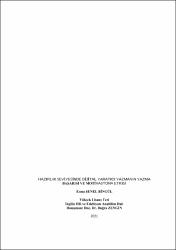| dc.contributor.advisor | Zengin, Buğra | |
| dc.contributor.author | Bingül, Esma Şenel | |
| dc.date.accessioned | 2022-04-06T06:50:00Z | |
| dc.date.available | 2022-04-06T06:50:00Z | |
| dc.date.issued | 2021 | |
| dc.identifier.uri | https://tez.yok.gov.tr/UlusalTezMerkezi/TezGoster?key=9MiDp3x86xrwjpi5-14w-WCZBcHBK5qNACGmJHhEYwcf27MA-3Ij4kpST9Kc3PBx | |
| dc.identifier.uri | https://hdl.handle.net/20.500.11776/4362 | |
| dc.description.abstract | Yazma becerisi, hem ana dilde hem de yabancı dilde öğretmenler ve öğrenciler için her zaman zorlu bir süreç olmuştur. Öğrenciler fikirlerine nasıl başlayacakları ve onları nasıl organize edecekleri konusunda endişelenirken, öğretmenler öğrencilerini yazma becerilerine karşı motive etmekte sorun yaşarlar. Yazılan ürünün kalitesi istenilen düzeyde olmadığında öğrenciler, yazma sürecindeki en büyük sorunlardan biri olan kaygıyı hissederler. Zorlukların üstesinden gelmek ve bu süreçte öğrenicilere daha faydalı olabilmek için, yenilikçi ve umut vaat eden yöntemler yazma müfredatına entegre edilmelidir. Teknolojinin hayatımızın her aşamasında var olduğu ve büyük bir etkiye sahip olduğu kabul edilmektedir. Teknoloji ilerledikçe, sadece iletişimde değil eğitim sisteminde de büyük bir atılım yapmıştır. Sanal bir ortamda informal dil edinimine ilişkin bireysel deneyimler kazanma ve öğrencilerin motivasyonunu artıran, onları yaşam boyu öğrenenler olmaya yönlendiren öğrenen özerkliğini geliştirme fırsatı sağlamıştır. Bu sebeple, bu deneysel çalışma, dijital bir platform üzerinde web 2.0 teknolojileri esas alınarak B2 seviyesi yaratıcı yazma yeteneğini değerlendirme konusunu araştırmaktadır. Çalışmanın amacı, dijital yaratıcı yazmanın hazırlık okulu öğrencilerinin yazma becerilerini, yazmaya karşı tutum ve beklentilerini belirlemek ve keşfetmektir. Çalışma Türkiye'de bir vakıf üniversitesinin Yabancı Diller Yüksekokulu'nda uygulanmıştır. B2 seviyesinde 66 öğrenci bu çalışmaya katılmıştır. Deney ve kontrol grubu olarak birbirine denk iki grup seçilmiştir. Veriler, yazma becerileri final sınavlarından, Özbay ve Zorbaz tarafından adapte edilen Yazma Kaygısı Ölçeği Türkçe versiyonundan, öntest ve son testlerden ve yaratıcı yazma değerlendirme rubriği ile toplanmıştır. Çalışmaya katılan kişilerden veri toplandıktan sonra, bu kişilerin tutumları, beklentileri, motivasyonları ve yazma yeterlikleri analiz edilmiştir. Araştırmanın sonuçları dijital yaratıcı yazmanın hem akademik yazmayı geliştirdiğini hem de öğrencilerin yazma motivasyonunu artırmaya yardım ettiğini göstermiştir. Son olarak, bulgu ve sonuçlar elde edildikten sonra, hedef kitleye bazı pedagojik tavsiyeler verilmiştir. | en_US |
| dc.description.abstract | Writing skills have always been challenging for teachers and students both in the native and foreign languages. Students worry about starting and organizing their ideas, whereas teachers have trouble motivating their students towards writing skills. When the quality of the written product is not at the desired level, students feel anxious which is one of the biggest problems in the writing process. To overcome challenges and be more beneficial to learners in this process, innovative and promising methods should be integrated into the writing curriculum. It is globally accepted that technology has a significant influence and becomes omnipresent in every process of our lives. As technology advances, it has made an immense breakthrough in communication and the education system. It has provided an opportunity to gain individual experiences of informal language acquisition in a virtual environment and promote learner autonomy that increases learners' motivation and leads them to become lifelong learners. Thus, this experimental study investigates the evaluation of B2 level creative writing ability based upon using web 2.0 tools on a digital platform. The study aims to identify and explore the effect of digital creative writing on English Preparatory School students' writing skills, attitudes, and expectations towards writing. The study took place at a foundation university, the School of Foreign Languages in Turkey. 66 students in the B2 level participated in this research. Two groups that were equivalent to each other were chosen as experimental and control groups. Data were collected through final writing skills quizzes, the adaptation of the Daly-Miller Writing Apprehension Test to Turkish developed by Özbay and Zorbaz (2011), pre-test and post-test, creative writing rubric developed by the researcher. After obtaining data from participants who attended the study, attitudes, expectations, motivation, and writing proficiency were analyzed. The results indicated that digital creative writing not only improved academic writing achievement but also helped increase the writing motivation of the students. Finally, after attaining findings and results, some pedagogical recommendations were given for target groups. | en_US |
| dc.language.iso | eng | en_US |
| dc.publisher | Tekirdağ Namık Kemal Üniversitesi | en_US |
| dc.rights | info:eu-repo/semantics/openAccess | en_US |
| dc.subject | Dilbilim | en_US |
| dc.subject | Linguistics | en_US |
| dc.subject | Eğitim ve Öğretim | en_US |
| dc.subject | Education and Training | en_US |
| dc.subject | İngiliz Dili ve Edebiyatı | en_US |
| dc.subject | English Linguistics and Literature | en_US |
| dc.subject | Yaratıcılık | en_US |
| dc.subject | Yaratıcı yazma | en_US |
| dc.subject | Eğitim Teknolojileri | en_US |
| dc.subject | Yazma Kaygısı | en_US |
| dc.subject | Creativity | en_US |
| dc.subject | Creative Writing | en_US |
| dc.subject | Educational Technologies | en_US |
| dc.subject | Writing Apprehension | en_US |
| dc.title | The impact of digital creative writing on academic writing achievement and motivation at tertiary level | en_US |
| dc.title.alternative | Hazırlık seviyesinde dijital yaratıcı yazmanın yazma başarısı ve motivasyona etkisi | en_US |
| dc.type | masterThesis | en_US |
| dc.department | Enstitüler, Sosyal Bilimler Enstitüsü, İngiliz Dili ve Edebiyatı Ana Bilim Dalı | en_US |
| dc.identifier.startpage | 1 | en_US |
| dc.identifier.endpage | 125 | en_US |
| dc.institutionauthor | Bingül, Esma Şenel | |
| dc.relation.publicationcategory | Tez | en_US |
| dc.identifier.yoktezid | 667760 | en_US |



















